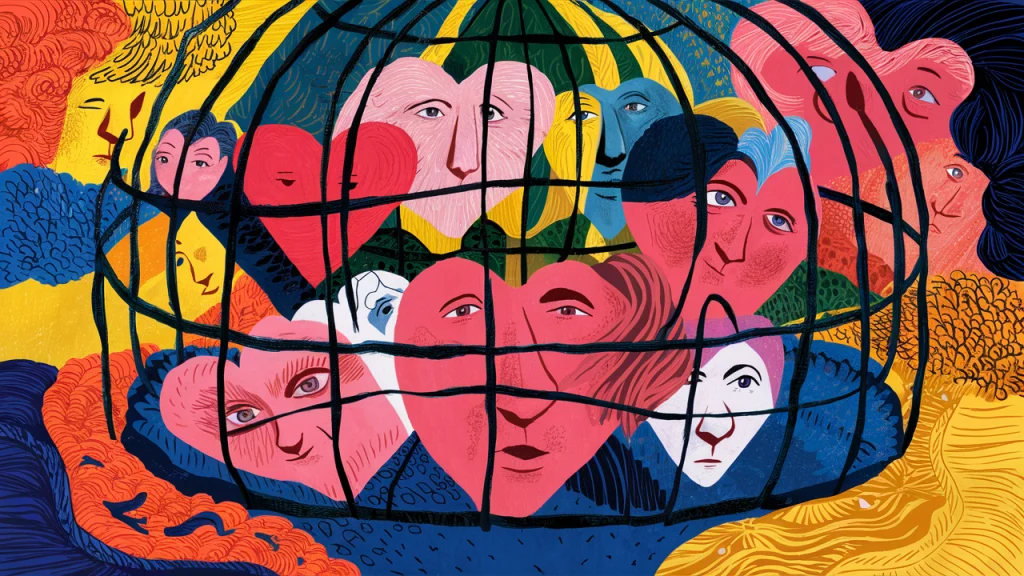Before we dive in, let’s take a moment to ponder a question: Do you believe in destiny? Are our lives written in the stars? Can two people be meant for each other? As children, many of us imagined relationships as fairy tales, with knights in shining armor and princesses waking up to true love’s kiss. But as we grow older, we start to question these fantasies. Do soulmates truly exist, or is this concept damaging our perception of love? Let’s explore how the belief in soulmates might be ruining romance.
The Origin of the Soulmate Myth

The idea of soulmates dates back to ancient times. According to Plato’s “Symposium,” humans originally existed as androgynous beings with four arms, four legs, and two faces. Fearing their power, Zeus split them in half, condemning them to search for their other half for eternity. This myth planted the seed that we are destined to find our true loves and live happily ever after. However, it also suggests that we can only be happy if we’re in love, casting singleness in a negative light.
Fast forward to modern times, and this ancient myth has evolved but remains embedded in our collective psyche. The concept of soulmates is romanticized in every aspect of our culture, from literature to films to music. We grow up hearing about the “one true love” who will complete us, making us feel whole. Yet, this beautiful notion can sometimes morph into an unhealthy obsession, driving us to seek an unrealistic ideal.
The Influence of Media on Our Belief in Soulmates

In today’s world, the media plays a significant role in shaping our beliefs about love and relationships. Research shows that 94% of young people turn to television and 90% to movies for advice on love, while only 33% look to their parents. From Cinderella’s prince searching for his destined princess to modern dating apps promising to find our perfect match, the idea of soulmates is deeply ingrained in our culture. This constant exposure reinforces the belief that finding a soulmate is the ultimate goal in life.
Consider the classic tale of Cinderella. A prince scours the kingdom to find the woman whose foot fits a glass slipper, suggesting an almost magical predestination. Fast forward to contemporary media, and you have movies like “The Notebook,” where two star-crossed lovers overcome all odds to be together, suggesting that such perfect matches exist and are worth any struggle. Even advertisements for dating apps tap into this desire, promising to help us find our “perfect match.”
But let’s be real: how often does life mimic a rom-com? Most of us won’t have our meet-cute on a rainy day in New York or lock eyes across a crowded room at a jazz club. The reality is often messier, filled with awkward first dates, mismatched expectations, and sometimes, heartbreak. Yet, the media rarely shows this side, leading us to chase an ideal that might not exist.
The Problem with Believing in Soulmates

Believing in soulmates, or “romantic destiny,” can set unrealistic expectations. This belief suggests that potential partners are either compatible or not, that relationships that don’t start well are doomed, and that failed relationships were never meant to be. This mindset can prevent us from finding and maintaining healthy relationships.
Unrealistic Expectations in the Dating Scene
When searching for a partner, many people create mental or physical checklists of qualities they desire. These lists can lead to objectifying potential partners and passing up suitable matches who don’t meet every criterion. For example, while someone might seem perfect on paper, the reality of a relationship with them can be very different. Relying on a checklist can prevent us from forming genuine connections.
Take Jane, a 29-year-old marketing executive. She has a detailed list of traits she believes her soulmate must possess: over six feet tall, a love for classical music, a penchant for cooking gourmet meals, and an affinity for hiking. On a first date, she meets Tom, who is charming, funny, and shares her love for adventure. However, Tom is only 5’10”, prefers jazz over Beethoven, and considers a good meal one that involves a microwave. Jane enjoys their time together but ultimately decides to pass because he doesn’t tick all her boxes. She misses out on a potentially great relationship because of her rigid adherence to her list.
The Danger of the Sunk Cost Fallacy in Relationships
The belief in soulmates can also lead to staying in unhealthy relationships due to the sunk cost fallacy—the idea that we’ve invested too much to give up. People might avoid addressing issues because admitting to problems feels like admitting they’re not soulmates. This can result in prolonged dissatisfaction and resentment, ultimately harming both partners.
Imagine Sarah and John, who have been together for five years. Initially, their relationship was blissful, but over time, small issues began to pile up. John leaves dirty dishes in the sink, and Sarah feels unappreciated. They both believe they are soulmates and think that addressing these issues would mean they aren’t meant to be together. Instead of communicating and working through their problems, they let resentment fester, leading to a toxic environment where neither feels fulfilled.
The Reality of Relationships: Imperfection and Effort

In reality, relationships require effort and compromise. The belief that soulmates should never fight or face difficulties is harmful. Disagreements and challenges are natural and can even strengthen a relationship when addressed constructively.
Take Emma and Chris, for example. They met in college and had an instant connection. Over the years, they faced numerous challenges, from job relocations to financial stress. Instead of seeing these obstacles as signs they weren’t meant to be, they viewed them as opportunities to grow together. They communicated openly, sought counseling when needed, and embraced each other’s imperfections. Their relationship isn’t perfect, but it is strong, built on mutual respect and effort.
Embracing Imperfection
Letting go of the soulmate myth involves embracing imperfections in ourselves and our partners. No one is perfect, and expecting perfection sets us up for disappointment. Instead, we should focus on building healthy, realistic expectations and appreciating the unique qualities of our partners.
For instance, consider the story of Lisa and Mark. Lisa always imagined her soulmate would be someone who shared her love for spontaneous travel. Mark, on the other hand, is a planner who prefers well-thought-out vacations. Initially, Lisa felt disappointed that their travel styles didn’t align. However, she soon realized that Mark’s planning made their trips more enjoyable and stress-free. By embracing their differences and finding a balance, they created a partnership that works for both of them.
The Societal Impact of the Soulmate Myth

The soulmate myth also perpetuates the idea that being single is undesirable. It creates pressure to find a perfect partner and settle down, leading to anxiety and dissatisfaction for those who are single. This societal pressure can cause people to rush into relationships that aren’t right for them, just to avoid being alone.
Consider the case of Julia, a successful entrepreneur in her mid-thirties. Despite her accomplishments, she feels societal pressure to find a partner and settle down. This leads her to enter a relationship with David, who, while kind and attentive, doesn’t share her passion for her work or her values. Julia ignores the red flags, driven by the fear of being single. Eventually, the relationship ends painfully, reinforcing her doubts about love.
Think Friends With Benefits is all fun and no strings? Dive into the complexities and decide if it’s truly for you!
Moving Beyond the Soulmate Myth

To combat the negative effects of the soulmate myth, we must change our mindset. This involves recognizing that relationships require work and that no one is perfect. We should focus on personal growth and building meaningful connections without the pressure of finding a soulmate. By doing so, we can enjoy healthier, more fulfilling relationships.
Embracing Realism in Love
Shifting our perspective on love involves understanding that it is not a fairy tale but a journey filled with ups and downs. It’s about two imperfect people coming together and growing both individually and as a couple. Real love is about patience, understanding, and continuous effort.
Building Healthy Relationships
To build healthy relationships, we need to communicate openly, set realistic expectations, and embrace the journey. It’s essential to recognize that conflicts are a natural part of any relationship and can be opportunities for growth and deeper understanding.
Ready to discover the magic of true love? Dive into the world of “The Soulmate Equation,” a captivating tale that blends romance and science. Join Jess as she navigates the complexities of love, guided by a revolutionary matchmaking algorithm. Will data lead her to her perfect match, or will it take a leap of faith? Find out in this heartwarming, thought-provoking read. Grab your copy now and embark on a journey to find your own soulmate!
Conclusion
Believing in soulmates might seem romantic, but it can set unrealistic expectations and harm our relationships. By letting go of this myth and embracing the reality of imperfection, we can build healthier connections and find true happiness. Remember, you are complete on your own, and a fulfilling relationship comes from mutual effort and understanding.
However, the journey of love doesn’t have to be entirely devoid of a little mystical guidance. While it’s essential not to become desperate in our search for a partner, a touch of psychic insight can sometimes help us navigate the complexities of romance. This is where the Psychic Soulmate Sketch by Psychic Luna comes into play.
Psychic Luna offers a unique service where she creates a personalized sketch of your potential soulmate. This sketch isn’t meant to dictate your destiny or replace the need for genuine connection and effort in relationships. Instead, it serves as a fascinating tool that can offer guidance and perhaps a glimpse into what the future holds. By having a visual representation of your potential soulmate, you might find a sense of direction and clarity, helping to shorten the path to finding meaningful and fulfilling relationships.
So, while you shouldn’t rely solely on the concept of soulmates, exploring Psychic Luna’s sketch can be a fun and intriguing way to enhance your journey. It’s a gentle reminder that love can be a blend of effort, openness, and a little bit of magic.
FAQ
What is the origin of the soulmate concept?
The soulmate concept originates from Plato’s “Symposium,” where humans were split in half by Zeus and destined to search for their other half.
How does the belief in soulmates affect relationships?
Believing in soulmates sets unrealistic expectations and can prevent people from forming and maintaining healthy relationships.
Why is the soulmate myth problematic?
The soulmate myth suggests that relationships should be effortless and perfect, which is unrealistic and can lead to dissatisfaction and breakups.
Can believing in soulmates lead to unhealthy relationships?
Yes, it can lead to staying in unhealthy relationships due to the sunk cost fallacy and avoiding addressing issues because it challenges the idea of being soulmates.
How can I let go of the soulmate myth and build healthier relationships?
Focus on personal growth, embrace imperfection, and build meaningful connections based on mutual effort and understanding.
